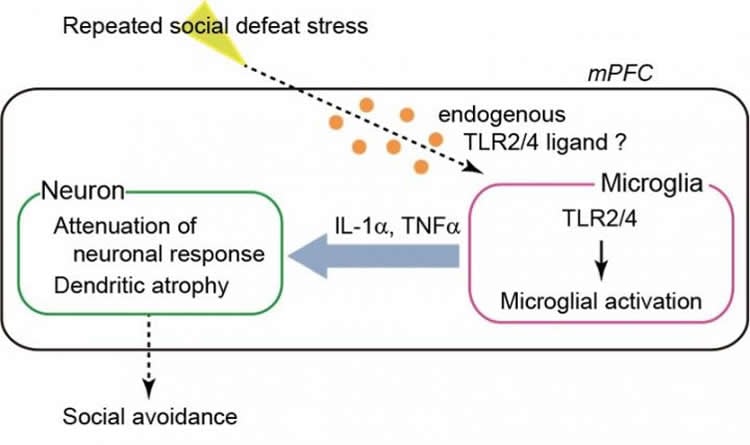Summary: Researchers report repeated social defeat stress activates microglia in the medial prefrontal cortex, triggering inflammation related cytokines. This leads to impaired neural responses in the mPFC, resulting in depressive behavior.
Source: Kobe University.
A group of Japanese researchers has discovered that neural inflammation caused by our innate immune system plays an unexpectedly important role in stress-induced depression. This insight could potentially lead to the development of new antidepressants targeting innate immune molecules. The findings were published in the online edition of Neuron.
The joint study was led by Professor Tomoyuki Furuyashiki and Assistant Professor Shiho Kitaoka (Kobe University Graduate School of Medicine) in collaboration with Project Professor Shuh Narumiya (Kyoto University Graduate School of Medicine).
Previous research had already hinted at the link between inflammation and depression: increased levels of inflammation-related cytokines in the blood of patients suffering from depression, activation of microglia (inflammation-related cells in the brain) in depressive patients, and a high percentage of depression outbreaks in patients suffering from chronic inflammatory disease. However, the exact relationship between depression and inflammation still contains many unknowns.
Psychological stress caused by social and environmental factors can trigger a variety of changes in both mind and body. Moderate levels of stress will provoke a defensive response, while extreme stress can lower our cognitive functions, cause depression and elevated anxiety, and is a risk factor for mental illnesses. The research team focused on repeated social defeat stress (a type of environmental stress) with the aim of clarifying the mechanism that causes an emotional response to repeated stress.
First, they looked at changes of gene expression in the brain caused by repeated social defeat stress and found that repeated stress increased a putative ligand for the innate immune receptors TLR2 and TLR4 (TLR2/4) in the brain. Their next step was to investigate the role of TLR2/4 in repeated stress using a mouse with the TLR2/4 genes deleted. They found that TLR2/4-deficient mice did not show social avoidance or extreme anxiety when exposed to repeated stress. Repeated stress usually triggers microglial activation in specific areas of the brain such as the medial prefrontal cortex, causing impaired response and atrophy of neurons, but these responses were not present in the TLR2/4-deficient mice.

The research team then developed a method to selectively block the expression of TLR2/4 in the microglia of specific areas of the brain. By blocking the expression of TLR2/4 in the microglia of the medial prefrontal cortex, they managed to suppress depressive behavior in response to repeated social defeat stress. They found that repeated stress induced the expression of inflammation-related cytokines IL-1α and TNFα in the microglia of the medial prefrontal cortex via TLR2/4. The depressive behavior was suppressed by treating the medial prefrontal cortex with neutralizing antibodies for the inflammation-related cytokines.
These results show that repeated social defeat stress activates microglia in the medial prefrontal cortex via the innate immune receptors TLR2/4. This triggers the expression of inflammation-related cytokines IL-1α and TNFα, leading to the atrophy and impaired response of neurons in the medial prefrontal cortex, and causing depressive behavior.
Professor Furuyashiki says: “These findings demonstrate the importance of neural inflammation caused by the innate immune system for stress-induced depression. This could lead to the development of new antidepressant medication targeting innate immune molecules”.
Funding: Japan Agency for Medical Research and Development, Japan Science and Technology Agency, Japan Society for the Promotion of Science, Ministry of Education Culture Sports Science and Technology in Japan, Uehara Memorial Foundation, Sumitomo Foundation funded this study.
Source: Eleanor Wyllie – Kobe University
Publisher: Organized by NeuroscienceNews.com.
Image Source: NeuroscienceNews.com image is credited to Kobe University.
Original Research: Abstract for “The Innate Immune Receptors TLR2/4 Mediate Repeated Social Defeat Stress-Induced Social Avoidance through Prefrontal Microglial Activation” by Xiang Nie, Shiho Kitaoka, Kohei Tanaka, Eri Segi-Nishida, Yuki Imoto, Atsubumi Ogawa, Fumitake Nakano, Ayaka Tomohiro, Kazuki Nakayama, Masayuki Taniguchi, Yuko Mimori-Kiyosue, Akira Kakizuka, Shuh Narumiya’Correspondence information about the author Shuh NarumiyaEmail the author Shuh Narumiya, Tomoyuki Furuyashiki in Neuron. Published July 19 2018.
doi:10.1016/j.neuron.2018.06.035
[cbtabs][cbtab title=”MLA”]Kobe University”Neuroinflammation Play a Critical Role in Stress Induced Depression.” NeuroscienceNews. NeuroscienceNews, 19 July 2018.
<https://neurosciencenews.com/neuroinflammation-stress-depression-9584/>.[/cbtab][cbtab title=”APA”]Kobe University(2018, July 19). Neuroinflammation Play a Critical Role in Stress Induced Depression. NeuroscienceNews. Retrieved July 19, 2018 from https://neurosciencenews.com/neuroinflammation-stress-depression-9584/[/cbtab][cbtab title=”Chicago”]Kobe University”Neuroinflammation Play a Critical Role in Stress Induced Depression.” https://neurosciencenews.com/neuroinflammation-stress-depression-9584/ (accessed July 19, 2018).[/cbtab][/cbtabs]
Abstract
The Innate Immune Receptors TLR2/4 Mediate Repeated Social Defeat Stress-Induced Social Avoidance through Prefrontal Microglial Activation
Highlights
•Repeated stress activates mPFC microglia through innate immune receptors TLR2/4
•Activated microglia induce response attenuation and atrophy of mPFC neurons
•Activated microglia underlie repeated stress-induced social avoidance
•TLR2/4 induce IL-1α and TNF-α in mPFC microglia, leading to social avoidance
Summary
Repeated environmental stress has been proposed to induce neural inflammation together with depression and anxiety. Innate immune receptors, such as Toll-like receptors (TLRs), are activated by exogenous or endogenous ligands to evoke inflammation. Here we show that the loss of TLR2 and TLR4 (TLR2/4) abolished repeated social defeat stress (R-SDS)-induced social avoidance and anxiety in mice. TLR2/4 deficiency mitigated R-SDS-induced neuronal response attenuation, dendritic atrophy, and microglial activation in the medial prefrontal cortex (mPFC). Furthermore, mPFC microglia-specific TLR2/4 knockdown blocked social avoidance. Transcriptome analyses revealed that R-SDS induced IL-1α and TNF-α in mPFC microglia in a TLR2/4-dependent manner, and antibody blockade of these cytokines in the mPFC suppressed R-SDS-induced social avoidance. These results identify TLR2/4 as crucial mediators of R-SDS-induced microglial activation in the mPFC, which leads to neuronal and behavioral changes through inflammation-related cytokines, highlighting unexpected pivotal roles of innate immunity in the mPFC in repeated environmental stress-induced behavioral changes.






